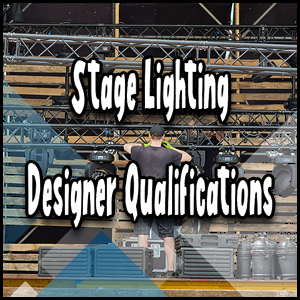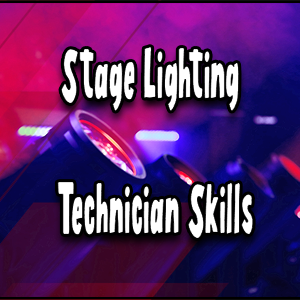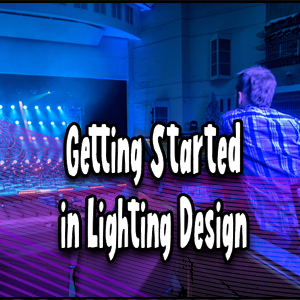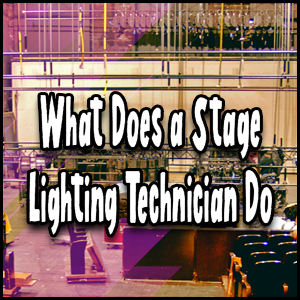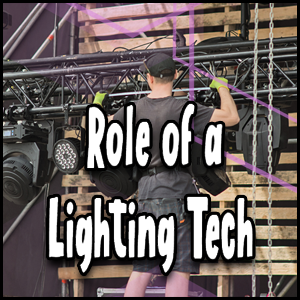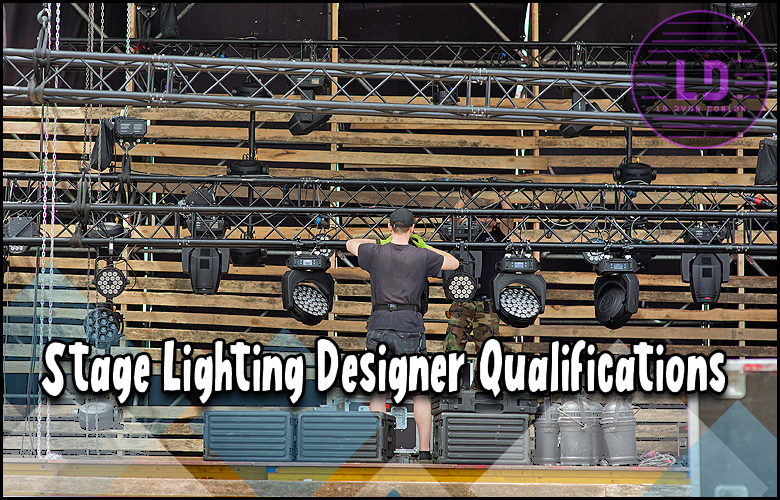
Last Updated on May 18, 2025 by LD Ryan Conlon | 🕒 [reading-time]
Lighting up a stage is not just about throwing some colors around.
It’s the art of creating an ambience that transports the audience into the playwright’s world.
Being at the helm of such power requires mastery, creativity and advanced technical skills.
As you navigate this article on Stage Lighting Designer qualifications, you’ll uncover not only the education and professional requirements vital for this role but also the set of crucial soft skills that can land you a successful career in this remarkable field.
Buckle up as we delve deeper into what shapes the shadows and orchestrates illumination behind every spectacular performance!
To become a stage lighting designer, it is recommended to have a bachelor’s degree in lighting design or theater production. Experience in a lighting assistant position is also valuable. While not necessary, many lighting designers pursue a master’s degree in lighting design to further enhance their skills and knowledge. Important qualifications for this career include artistic, creative, and technical skills. Basic knowledge of construction and electrical safety is also necessary. Keep in mind that the specific qualifications may vary depending on the employer and location.
Pathways to Becoming a Stage Lighting Designer
Becoming a stage lighting designer requires a combination of education, experience, and a passion for the creative and technical aspects of lighting design.
While there isn’t a set path to follow, there are common pathways that many professionals take to establish themselves in this field.
One pathway is through formal education, where aspiring lighting designers pursue a bachelor’s degree in lighting design or theater production.
These programs provide a comprehensive understanding of lighting design principles, stagecraft, theatrical production, and technical skills needed to excel in this role.
Through coursework and hands-on experience, students gain knowledge about different lighting technologies, equipment, and techniques used in live productions.
Think of formal education as the foundation of a house.
It provides you with the necessary tools and skills to build upon your career as a stage lighting designer.
Another pathway is gaining experience through practical work in the field.
Many aspiring lighting designers start by working as lighting assistants or technicians in theaters or event production companies.
This gives them firsthand experience of the inner workings of stage lighting and helps them develop practical skills in setting up and operating lighting systems.
Imagine a passionate individual who starts as a lighting assistant at their local theater company.
They gradually learn the ropes of stage lighting, working on various productions and expanding their knowledge and skillset.
This experience allows them to explore different approaches while honing their creativity and problem-solving abilities.
Additionally, some individuals choose to pursue higher education by obtaining a master’s degree in lighting design.
This advanced degree can provide specialized training that enhances artistic vision and technical expertise, allowing aspiring lighting designers to stand out in the competitive job market.
Master’s programs often offer opportunities for internships, collaborations with industry professionals, and access to state-of-the-art facilities which aids in building connections within the industry.
Now that we’ve explored the different pathways to becoming a stage lighting designer, let’s discuss the various degree and certification options available to aspiring professionals.
- According to the U.S Bureau of Labor Statistics, as of 2022, about 64% of entry-level jobs for lighting designers required a bachelor’s degree in Theater Production or Lighting Design.
- A survey conducted by the Association of Lighting Designers in 2023 noted that nearly 35% of professional stage lighting designers have pursued a master’s degree in the field.
- The Occupational Outlook Handbook reports that up to 75% of job postings for lighting designers request at least two years of experience in a related position, such as a lighting assistant job.
- Becoming a stage lighting designer requires a combination of education, experience, and passion. Formal education, such as a bachelor’s degree in lighting design or theater production, provides a strong foundation by teaching the principles and technical skills necessary for the role. Gaining practical experience through work as a lighting assistant or technician in theaters or event production companies is also crucial for developing hands-on skills and industry knowledge. Some individuals may choose to pursue a master’s degree in lighting design to further specialize and enhance their artistic vision and technical expertise. Overall, regardless of the pathway chosen, continuous learning and staying updated with new technologies and techniques is essential for success in this competitive field.
Degree and Certification Options
While a formal degree isn’t always required to become a stage lighting designer, it can provide valuable knowledge, enhance technical skills, and increase job prospects.
There are various degree options to consider, such as a Bachelor of Fine Arts (BFA) in Lighting Design, Bachelor of Arts (BA) in Theater with a specialization in lighting, or a Bachelor of Science (BS) in Theater Technology.
For example, an individual who pursues a BFA in Lighting Design would take courses focused specifically on lighting design principles, color theory, computer-aided drafting (CAD), and advanced lighting technologies.
Under the guidance of experienced faculty members and industry professionals, students have the opportunity to develop their artistic vision and gain hands-on experience through designing and executing lighting plans for theatrical productions.
In addition to degrees, there are also certification programs available that can complement formal education.
For example, the Entertainment Technician Certification Program (ETCP) offers certifications in areas such as Rigging, Arena Rigging, and Theater Rigging.
These certifications demonstrate expertise and proficiency in specific areas related to stage production and can boost credibility and marketability.
Think of certifications as specialized tools that you can add to your toolbox.
They validate your skills and knowledge in specific aspects of stage lighting design.
Aspiring stage lighting designers have different paths to choose from when pursuing their career.
Whether you opt for a formal degree program or gain hands-on experience through apprenticeships and internships, each pathway provides unique opportunities for growth and development in this exciting field.
Experience and Portfolio Building
When it comes to pursuing a career as a stage lighting designer, experience and building a strong portfolio are crucial steps towards success.
While formal education in lighting design or theater production is beneficial, hands-on experience can often be equally, if not more, valuable.
So how can one gain the necessary experience and develop an impressive portfolio?
Imagine you are an aspiring lighting designer named Sarah.
You have completed your bachelor’s degree in theater production with a focus on lighting design, congratulations!
Now it’s time to put your knowledge into practice and start building your resume.
Internships and Apprenticeships: One way to gain practical experience is by seeking internships or apprenticeship opportunities with reputable theater companies, event production companies, or lighting design firms.
This allows you to work alongside experienced professionals, learn industry techniques, and expand your network within the field.
Additionally, internships provide excellent opportunities to showcase your skills and dedication to potential employers.
Volunteering: Don’t underestimate the power of volunteering!
Many community theaters or local music venues are often in need of individuals who can contribute their lighting expertise.
By offering your services for free initially, you not only gain valuable hands-on experience but also increase your chances of making connections with industry professionals who may offer paid opportunities in the future.
Gaining experience is essential, but having a well-rounded portfolio that showcases your skills and creativity is equally important.
Essential Skills and Qualifications
To stand out as a stage lighting designer, several skills and qualifications are essential for success in this competitive field.
Let’s explore some key elements that make up the foundation of a successful career as a lighting designer.
Artistic and Creative Skills: A strong aesthetic sense combined with creativity is paramount for a stage lighting designer.
Being able to understand the mood, tone, and emotional impact of a performance or event allows you to create lighting designs that enhance the overall experience.
Additionally, having an eye for detail and a keen sense of color theory can elevate your work to new heights.
Technical Expertise: Alongside artistic creativity, a strong foundation in technical expertise is crucial.
Understanding different types of lighting fixtures, control systems, and rigging techniques is essential for executing your lighting designs effectively and safely.
Familiarity with CAD software and other design tools can also be valuable in creating accurate plans and visualizations.
Think of a stage lighting designer as the conductor of an orchestra.
They need both the creative vision to interpret the music and guide the musicians, as well as the technical expertise to understand the intricacies of each instrument.
Construction and Electrical Safety Knowledge: As a lighting designer, you will often work closely with set designers, electricians, and other professionals involved in stage production.
Having a basic understanding of construction methods and electrical safety protocols ensures effective collaboration and reduces the risk of accidents or conflicts during installations.
Problem-Solving and Adaptability: In the fast-paced world of live performances, unexpected challenges are bound to arise.
Being able to think on your feet, troubleshoot technical issues quickly, and adapt your designs to various venues or budgets is a valuable skill that will set you apart from others.
With solid experience under your belt and essential skills acquired, you are well on your way to pursuing a successful career as a stage lighting designer!
But wait, there’s more! Let’s dive deeper into another aspect of essential qualifications: technological expertise.
Technological Expertise
In the modern era of stage lighting design, technological expertise is an essential requirement for professionals in the field.
As technology advances at a rapid pace, lighting designers must stay updated with the latest equipment and software to create captivating visual experiences.
Proficiency in computer-aided drafting (CAD) software is crucial for designing lighting plots and understanding the technical aspects of light fixture placement.
Additionally, knowledge of lighting control systems, such as DMX protocols and programming, is vital for executing intricate lighting cues accurately.
Beyond CAD and lighting control systems, familiarity with various types of lighting fixtures and their functionalities is necessary.
Different performance spaces may require different types of fixtures, including conventional lights, LED lights, moving lights, and intelligent lighting systems.
Lighting designers should understand the strengths and limitations of each type and how they can be utilized to enhance the visual atmosphere of a production.
Technical troubleshooting skills are also paramount for lighting designers.
Inevitably, technical issues may arise during performances or rehearsals – from addressing faulty equipment to resolving connectivity problems.
A thorough understanding of electrical systems and practical problem-solving abilities enables lighting designers to quickly resolve issues and ensure that the show goes on seamlessly.
For instance, imagine being in charge of the lighting design for a high-profile concert where one of the moving lights suddenly malfunctions mid-performance.
With your technological expertise, you swiftly identify the cause—a loose connection—and rectify it without interrupting the show, ensuring an uninterrupted immersive experience for both the performers and audience.
Technological expertise serves as a strong foundation for success in stage lighting design but is incomplete without artistic and creative ability.
Artistic and Creative Ability
While technological expertise provides a solid framework for executing stage lighting designs effectively, artistic and creative ability adds the touch of magic that elevates productions to new heights.
The role of a lighting designer goes far beyond simply illuminating a stage; it involves using light as an artistic medium to evoke emotions, enhance storytelling, and create visually stunning compositions.
A keen eye for aesthetics is crucial for a lighting designer to effectively evoke the desired mood and atmosphere of a production.
They must possess a deep understanding of color theory, the interplay of light and shadow, and the impact of different lighting techniques on visual perception.
By skillfully manipulating these elements, lighting designers can create dynamic visual landscapes that enhance the narrative and engage the audience on a profound level.
Consider a scene in a play where two characters are engaged in emotional dialogue.
Through precise lighting choices – like soft warm tones and delicate side lighting – a lighting designer can emphasize the intimacy and vulnerability of the moment.
This deliberate use of light not only enhances the audience’s connection to the characters but also amplifies the emotional impact of the scene.
Creative problem-solving is another valuable skill that sets great lighting designers apart.
Whether it’s designing unique lighting rig configurations for unconventional performance spaces or finding innovative solutions to overcome budgetary constraints, artistic and creative ability allows designers to think outside the box and deliver exceptional results.
As we have seen, technological expertise and artistic creativity are both indispensable qualities for a successful career in stage lighting design.
In the following section, we will explore the job market and career prospects for aspiring lighting designers.
Job Market and Career Prospects for Lighting Designers
The field of stage lighting design presents an exciting array of career opportunities for those with a passion for both the technical and artistic aspects of theater.
With the ever-growing demand for immersive and visually captivating stage productions, the job market for lighting designers is thriving.
According to recent data, there are currently 61 theatrical lighting designer jobs available on popular job search websites like Indeed, offering a range of positions in various locations across the United States.
From renowned theater companies to educational institutions and event production companies, there is a diverse range of organizations seeking talented lighting designers.
For instance, you may find job opportunities with institutions like Denver Center for the Performing Arts, Houston Christian University, Virginia Commonwealth University, or even entertainment companies like Oak View Group or Newell Entertainment.
Let’s take a closer look at one such opportunity with the Denver Center for the Performing Arts.
As a lighting designer within this esteemed organization, you would have the chance to work on high-profile stage productions, collaborating with experienced directors and creative teams.
This not only provides an avenue for personal growth but also enables you to showcase your talent on a larger scale.
The career prospects in this field are promising, especially for those who possess a strong blend of technical expertise and artistic sensibility.
However, it’s important to highlight that competition can be fierce in this industry. The key to standing out lies in developing a unique style and continuously honing your skills.
The Role of Lighting Design in Stage Production
Behind every memorable stage performance lies the meticulous work of a lighting designer.
Their role goes beyond illuminating actors and sets; rather, they use light as a tool to evoke emotions, set moods, portray depth, and guide audiences’ focus throughout a production.
In essence, lighting designers are crucial in creating the visual narrative that complements and enhances the overall theatrical experience.
At the heart of their craft lies a deep understanding of color theory, composition, and the technical aspects of lighting equipment.
Lighting designers work closely with directors, set designers, and costume designers to create a cohesive visual concept that aligns with the production’s theme and artistic vision.
They artfully balance lighting intensities, angles, and colors to accentuate specific scenes, transitions, or climactic moments.
Let’s consider an example to better illustrate their impact.
Imagine a dramatic scene where two characters engage in a heated argument.
A skilled lighting designer would strategically use warm and intense hues to amplify the tension in the air, casting shadows to heighten the emotional intensity.
Conversely, during a serene moment of reflection, they may opt for softer lighting with cool undertones to create a calm and introspective atmosphere.
In addition to their creative contributions, lighting designers also play a critical role in ensuring the safety and functionality of stage lighting systems.
They must possess technical proficiency in operating lighting consoles, knowledge of electrical considerations, familiarity with different types of fixtures and control systems, as well as understanding how to achieve desired effects while adhering to industry safety standards.
Overall, the role of lighting design in stage production is multifaceted and indispensable. It demands a unique blend of creativity, technical prowess, collaboration skills, and adaptability.
By seamlessly marrying cutting-edge technology with artistic vision, lighting designers have the power to elevate performances from ordinary to extraordinary.
Are there any specific certifications or licenses needed for this profession?
Yes, there are specific certifications and licenses needed for a career as a stage lighting designer.
One of the most common certifications is the Certified Lighting Designer (CLD) credential offered by the International Association of Lighting Designers (IALD).
This certification signifies that a lighting designer has met certain educational and professional experience requirements, ensuring their expertise in designing and implementing lighting systems.
Additionally, some states or countries may require stage lighting designers to obtain a license to work in certain venues or productions, further validating their qualifications and adherence to safety regulations.
How much experience is typically expected before working as a professional stage lighting designer?
The amount of experience typically expected before working as a professional stage lighting designer can vary.
However, it is generally recommended to have at least 2-3 years of practical experience in the field, including working on various productions and gaining hands-on knowledge of lighting equipment and design techniques.
This experience enables designers to develop a strong foundation in understanding the technical aspects of stage lighting, honing their creative skills, and building a portfolio to showcase their work to potential employers or clients.
While there are no specific statistics available on the industry-wide expectations for experience, many successful stage lighting designers emphasize the importance of practical experience in order to excel in this highly competitive field.
What educational background is required to become a stage lighting designer?
A strong educational background in lighting design or a related field is typically required to become a stage lighting designer.
Many professionals in this field hold a bachelor’s or master’s degree in theater arts, technical theater, or lighting design.
According to the U.S. Bureau of Labor Statistics, around 83% of lighting designers have a bachelor’s degree, while 17% have a master’s degree.
These programs provide valuable training in areas such as stagecraft, electrician skills, and design principles, preparing individuals for the technical and artistic aspects of the role.
Are there any specific software or technical knowledge requirements for this role?
Yes, there are specific software and technical knowledge requirements for the role of a stage lighting designer.
In today’s industry, proficiency in lighting design software such as Vectorworks Spotlight or Capture is essential for creating accurate 3D models and visualizations of lighting designs.
Additionally, knowledge of programming lighting consoles like GrandMA or Avolites is crucial for controlling and cueing lighting effects during live performances.
According to a survey conducted by the International Association of Lighting Designers, 85% of professional lighting designers consider proficiency in software and technical skills as important criteria for hiring.
What skills are important for a stage lighting designer to possess?
The skills important for a stage lighting designer to possess include a strong understanding of lighting equipment and techniques, creativity in designing unique lighting setups, and the ability to collaborate effectively with other team members.
According to a survey conducted by the International Association of Lighting Designers, 90% of professional lighting designers consider technical knowledge and proficiency in lighting equipment to be crucial for success in the field.
Furthermore, 85% highlight the significance of creative problem-solving skills to develop innovative lighting designs that enhance the overall performance.
Lastly, effective communication and teamwork skills are essential to ensure smooth coordination with directors, set designers, and other professionals involved in the production.
Related Posts
- The Ultimate Guide to Getting Started in Stage Lighting Design
- Stage Lighting Technician Essential Skills for a Successful Career
- How to Become a Freelance LD (Lighting Designer)
- What Does a Stage Lighting Technician Do? Job Description
[scriptless]
Pins for Pinterest
If you like what you see, feel free to share some love on Pinterest ❤️

